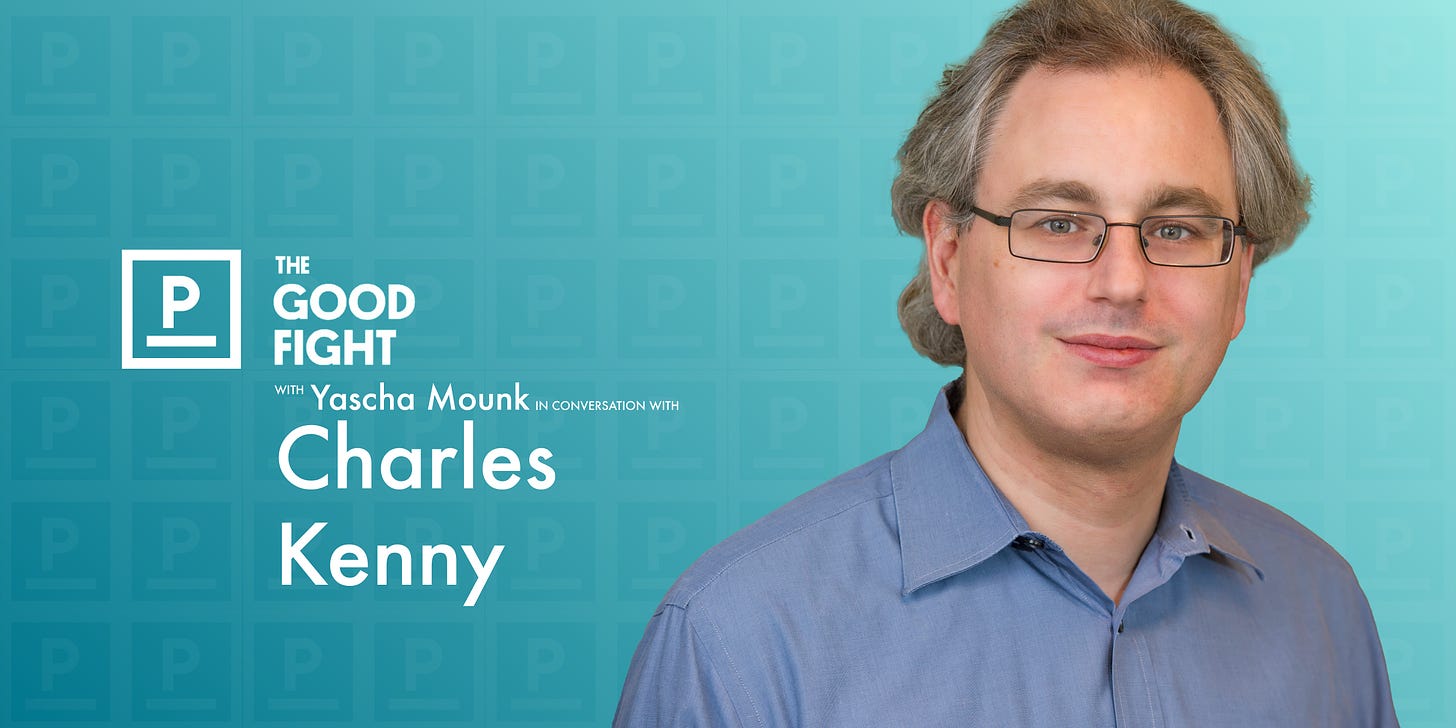Charles Kenny is a writer-researcher and a senior fellow at the Center for Global Development. Previously, he spent fifteen years as an economist at the World Bank. His books include The Plague Cycle: The Unending War Between Humanity and Infectious Disease and The Upside of Down: Why the Rise of the Rest is Good for the West.
In this week’s conversation, Yascha Mounk and Charles Kenny discuss why development aid is more effective than its critics claim; why it is easier to solve "stuff" problems than it is to solve "non-stuff" problems; and why effective altruists need to start thinking bigger.
The views expressed are those of the speakers, not those of Persuasion. The transcript has been condensed and lightly edited for clarity.
Yascha Mounk: You've written fascinatingly about a very broad range of topics. To start off, how much progress has the world made towards being a better place over the course of our lifetimes?
Charles Kenny: Over our lifetimes, a lot. There is a long way to go. And a fair amount of progress was made before our lifetimes. But if I was to choose one single measure over the course of our lifetimes, it would be that the number of children who die before the age of five has gone down by more than three-quarters—probably seven-eighths, actually. And if you just want one measure of progress, parents not having to bury one of their children has gone, over the course of our lifetimes, from something that would be normal and expected in most of the world to something that is extremely rare almost everywhere.
The Romans have poems about the sadness of losing their daughters. It is not a modern thing to be upset about the death of a child—that is a permanent state of humanity. Even with coping mechanisms, even with the social norms that probably helped, it still was a terrible thing. And it is now a terrible thing that is much rarer, which is the result of a whole bunch of other rather nice stuff. All of us are getting less horrible bouts of diarrhea, all of us are getting smallpox considerably less often than we used to; nearly all of us are living in nicer houses; the vast majority of the world has access to electricity and improved water sources—all statements that were just not true 70 or 80 years ago. The progress is really widespread.
Mounk: I feel like there's just a natural negativity bias in the news where the sudden flood is going to make the front page of a newspaper, but this sort of slow, gradual improvement in all kinds of everyday systems—which actually have brought about this really stunning improvement on this metric and many others—is by its nature harder to capture in compelling stories. What is the underlying causal mechanism here? How has the incidence of infant mortality, for example, been reduced seven, eight-fold over the course of a half-century?
Kenny: Just to be clear, I think the famines ought to be on the front pages. The remaining misery ought to be on the front pages. Because we have made all this progress, and that these are things that we can deal with, makes the fact that they still happen even worse. We're more morally culpable than we used to be in a world where we couldn't do anything about them. And the reason we're so morally culpable is because of what lies behind it, which is largely technology change, which is a global public good, if you will. The fact that I know how to treat diarrhea with sugar, salt, and water doesn't stop you from doing the same to help your kid survive. So because it is a global public good, it ought to have spread worldwide. We are talking about really cheap interventions, especially when it comes to children’s health. We're talking about vaccines that cost cents to make and to deliver. Cheap, really cheap.
But we're also, importantly, talking about the value of making these things universal. I do think credit goes to the planet that, actually, most people are rather disgusted with the way that the COVID-19 vaccines rolled out, that, for example, very low risk people in rich countries had access to five or six times the vaccines they needed, whereas very high risk people in low-income countries had no access at all for most of the first year we had these vaccines. That caused moral outrage around the world, as it should. And, frankly, I don't think the moral outrage would have been as strong in the 1800s. We are more of a global community. We do think that everybody should have access to these technologies. And there's a widespread sense—vaccine deniers aside—that these technologies work. That's also, to some extent, a new thing. So it's not just about technologies. It’s about ideas. It's about delivery systems and institutions. But to come down to the single answer—it's technologies, and a simple way to think about it is that the average person on Planet Earth uses something like 200-times the amount of energy that they themselves could produce by bicycling away all day on a dynamo. We have just made the creation of stuff incredibly efficient and cheap through the use of machines. And we've made the movement of that stuff incredibly efficient and cheap for the same reasons. Anything that can be solved with stuff has become fairly cheap and easy to solve, and that certainly applies to global health.
Mounk: The subtitle of one of your books is “Why Global Development Is Succeeding—And How We Can Improve the World Even More.” You’ve told us a little bit about the reasons for the improvement on these really important metrics like child mortality.
What is still going wrong and what can politicians, international institutions, and all of us do to further push progress along?
Kenny: There are still hundreds of thousands of children dying each year from easily preventable diseases. There are still 700-plus million people living on $2.15 a day or less, which is the World Bank's latest measure of extreme poverty. And by the way, $2.15 isn't enough. More than half the world is still living on less than $10 a day. There is an immense amount of progress that still needs to be delivered in the “stuff” basket, if you will—making sure that people have enough to eat, access to electricity, clean water supplies, and so on. But to be honest, I think they are stuff challenges. And I think that’s the easier thing, in some ways. Where the problems are larger is not actually with the stuff elements, it's with the not-stuff that we care about—it's about relations, institutions, and how we get along as a planet. I'm sure you can argue at a greater length, depth and specificity on things like the decline of violence worldwide. We have seen some progress there. We have seen declines in the number of laws that enforce discrimination against particular groups and so on. And I'm not saying we haven't made progress in these areas, but it does seem to have been more halting, and more likely to suffer reverses than the progress on the stuff issues we've seen.
Mounk: When you look at the argument of somebody like Steven Pinker in his writing about the decline of violence—I think there's something really compelling there. He's convinced me that nostalgic treatments of the hunter-gatherers are just deeply naive. Rates of violence were astonishingly high. And there is a very, very long-standing trend towards less violence that he chronicles. Of course, when it comes to interstate conflict, we know that there are phases. Between World War I and World War II, the world looked like it was making progress, and then World War II came. We are currently, almost by definition, in the interwar period between World War II and World War III, and as Tom Lehrer pointed out in the 1960s, if we want any songs to come out of World War III, “we better start writing them now.”
Kenny: Yes, one of the things that our mastery over nature has given us is more power to create our own existential risks. And it is hard to measure progress given the possibility of mutual annihilation by thermonuclear war. How do you measure that? I sincerely hope it won't happen, obviously. It's reasonably plausible that it won't happen. But you look at the last year and a half and, surely, even if you thought the risk was very small, you've got to think it's a bit bigger now.
On genetic modification, nuclear, and fusion and so on, I accept that there are risks attached. There were surely risks attached to the mRNA vaccines from last year. I just think those risks are probably worth it. I also accept that you can try and put numbers on these risks, but we just don't have the information. We don't have the knowledge in order to pin them down in any way that's detailed, specific, and accurate enough, in order for that to be driving how we make decisions. It comes down to your view of the world as a whole.
Mounk: What is the argument for why there are rational reasons to be concerned about GM and nuclear fission? And why do you think those risks are limited enough that they are worth taking?
Kenny: They are reasonably new (nuclear isn’t all that new anymore) and untested technologies, and in the past, new and untested technologies have sometimes had unexpected outcomes. Many would argue we overregulate these new technologies. But I think, as a rule, we do well in trying to make sure that the obvious downside risks are addressed before these technologies are spread widely. Take for example, something I'm in favor of, which is gene drive technology to make mosquitoes barren and wipe them out.
Mounk: As I understand it, and I may be getting this wrong, the idea is that you genetically modify a mosquito in a way where it can outcompete existing mosquitoes; that you make sure that either they can’t procreate, or they can’t carry certain kinds of diseases, and that that may be a way of eradicating malaria, broadly speaking, and perhaps some other diseases.
Kenny: And from what I've read, I understand that, actually, in most places, most of the nastiest, problematic mosquitoes are invasive and it's probably not the case that they play a hugely important or positive role in local ecosystems. I'm not sure we can know that for certainty. There are surely unknowns in such an experiment. But I think it's probably an experiment worth trying, or at least, I certainly did think it was an experiment worth trying, before we saw, in the last year, stunning progress in malaria vaccines and treatments. Maybe the risk is less worth taking now, because we have these other options. But it's something that, a year ago, I certainly would have been in favor of. I think I still am. I do accept the risks, but I think that we have reasonably good ways to measure them. And reasonably good approaches to stagger rollout so that we limit the downside risks.
Mounk: But what about the more basic forms of genetically modified crops? I find consistently that this is one of the topics on which I have the most disagreement with friends whose judgment I generally respect. Especially in Europe, there is just a very strong consensus that there's something worrying or perhaps morally bad, and probably dangerous, around genetically modified crops. Why do you think that argument is wrong?
Kenny: Partially, I think there's a real marketing problem with the term “GM.” I mean, we have been modifying the genetics of crops since we invented farming, right? Probably even before, just using different approaches over time.
The mechanism we were using before GM, and we still are, is irradiating crops to try and speed up mutations to develop different varieties faster. It's not like we weren't mucking with nature before. We're just mucking with nature in a different way. Now, it is a new way of mucking with nature, which might make it more dangerous on the grounds that there are going to be more unknowns. Again, I'd say that the level of regulatory oversight is really quite high. The legitimate bit of the discussion, I think, is around intellectual property rights. If farmers can't use the seeds that they collect from their own crop to plant again next year because of intellectual property rights, well—there are some public policy issues there. I think it needs to be addressed and looked at. But on the “would I eat GM foods” debate—yes, I would. And I don't have a problem with it at all. I thank goodness for genetic modification. Otherwise, some large percentage of the planet couldn't be here, because we would have the grain yields that they had in Sumeria, which weren’t very high.
Mounk: About a year ago, I had Bill Easterly on this podcast. He is a really smart and thoughtful critic of the promise of development aid, effectively saying that it's very hard for giving institutions and nations to know what forms of aid actually go on to be helpful and effective on the ground, pointing out the adverse incentives that are created for it, where suddenly a lot of the smartest people locally go and work for the international NGOs, the organizations that come in with all of the foreign dollars, and it distorts the talent pool in costly ways. On average, nations that receive a lot of development aid don't don't tend to perform much better than those that don't receive a lot of development aid. I take those arguments seriously. But you come to a different conclusion. Where do you think Bill Easterly goes wrong in his arguments about this?
Kenny: We were just talking about grain yields. The Rockefeller Foundation rather famously played a huge role in the Green Revolution, and I think it would be hard to argue that those dollars were wasted. Ask the many, many people worldwide who aren't dead from famine as a result. But I do take Bill’s critiques seriously. I think most of them are valid—the extent to which they mean that aid as a whole is a waste is where I would push back. Bill is absolutely right that a lot of aid is wasted. You were pointing to the fact that a lot is effectively handed over to NGOs, or, indeed, private companies usually based in donor countries, who then go to developing countries and spend some of that money locally, and spend quite a lot of it on hiring, housing, and feeding their own expat staff. I do wonder about the efficacy of a lot of that aid—I should say, by the way, you know, I was a made member of the aid industry. I still probably officially am a member of the aid industry. So, guilty as charged. If you look at the amount of aid that is actually spent by governments and organizations based in the developing world, it is really small. To give you one example, the Washington Metropolitan Transit Authority here in DC. gets more of the USAID [United States Agency for International Development] budget than the government of Uganda. WMATA gets it because, apparently, it counts as overseas assistance when USAID buys its staff transit cards. More goes to buying transit cards for USAID staff than goes to the Ugandan government, and the Ugandan government is actually one of the top recipients of aid from the United States. Nearly all of the money that is spent on aid, in fact, never reaches governments and local organizations in the developing world. Far more goes to rich countries’ governments and organizations. I'm not saying all of that is wasted. I am saying that it is fairly amazing, given how little is spent in the way that we traditionally think of (by governments and recipients), that we do see an impact. The evidence on aid causing large economic growth—I think it's there. But it's certainly weak. And, actually, I would find it implausible if it wasn't small. It's not a very large amount of money. I don't expect to see a large impact.
That said, if you stop thinking macro for a minute and get to specific cases, Bill and I agree that, actually, if you look at global health, for example, it's hard to argue that there hasn't been a role for aid-financed activities. If you look at PEPFAR, which is the US-aid financed initiative that provides HIV drugs to a considerable proportion of the developing world, it's just obviously saved a whole lot of lives. And it is fairly obvious, at least to begin with, that none of that would have been covered by local governments. It was just too expensive. Again, if you look at vaccine rollout, nearly all the vaccines delivered in lower and lower middle income countries have been purchased by aid. A lot of those would have been purchased by lower middle income country governments had aid not done that. But those vaccines were around for a long time before they started being aid-financed, and they weren't being bought by low and low middle income country governments.
You can find cases where it is actually fairly clear that some aid has had a real impact. You can find lots of cases where aid is being used in ways that are incredibly inefficient, where there's no reason at all to expect aid to have an impact on the quality of life of low and middle income countries. I think if we took more aid from that second category, and put it into the first category, you'd see even greater impacts. Then we can maybe even add some more money to the budget.
Mounk: Part of the debate between you and Bill seems to be that he might point to some of the same facts that you just talked about, like WMATA and the government of Uganda, and he would argue that that's exactly the kind of thing that always goes wrong, so why should we trust the system to ever get better? Whereas you seem to say, “Actually, we can recognize some of those pitfalls and avoid them.” How do we make progress on this? If we want to make sure that actually more of that aid spending goes to things that really do make a difference, what transformation would that take, and is it realistic that we might be able to accomplish it?
Kenny: It's hard. And it's a reason why I'm sort of happy, that even with the low-impact spending that we see, I still think you can point to every dollar being worth pushing into the system, because what comes out at the other end is so wonderful. It’s worth it even with all of that waste along the way. It is a hard struggle, partially because there is a very junior version of the military industrial complex in development—the aid industrial complex—which is people like me, who work in development and live in Washington, DC, as it might be, and who like our lifestyles and want to get reasonably well paid. We are much closer to the corridors of power than the ultimate supposed recipients of assistance, and so have considerably more political control over how it's spent. I'm part of the problem. But it is amazing, if you look at the PEPFAR story—this George W. Bush era project that provides HIV drugs—it went from zero to many hundreds of millions very quickly. It did so because a whole bunch of people saw a real problem in developing countries, and there was a real constituency in the United States to fix that problem. Those two things went together. Much PEPFAR money does not reach developing countries, but a lot does, and a lot of HIV drugs do. It’s reasonably efficient. It’s about setting a target that aid can actually help reach (that means something reasonably small, because aid isn't a large amount of money) and persuading people that that target is really worth reaching, and then the politics fall in line.
Mounk: One of the things I've been thinking about, like many others over the last weeks and months, is Effective Altruism. Sam Bankman-Fried was a big advocate of Effective Altruism, and as his crypto empire has collapsed, and as it appears that he may have engaged in some illegal practices, the ideology of Effective Altruism has come into question alongside it.
I have torn feelings about this because it seems to me that the basic proposition of Effective Altruism is very compelling. When you look at how something like dollars in the aid budget are spent, so much of it goes to things that just aren't likely to have a significant impact on improving human welfare. To have an organized movement, which says, particularly to some of the biggest donors, “When you give, really think through where your dollars are going to have the biggest impact on saving lives, improving human development, and transforming the world.” That seems like an obviously good approach. On the other hand, it does seem that perhaps the interpretation of what Effective Altruism means has taken on a weird hue.
How can we use the basic insight of Effective Altruism that we surely want to hold on to, which is that if we're giving money, as people should, we’d better think about how to make an impact in the world that's actually positive for humans. But how do we sort of stop ourselves from falling into the kind of hubris that effective altruists appear to often fall into?
Kenny: I think the problem is one of scale. Sam Bankman-Fried at his richest wasn't nearly rich enough. Which is to say, much of the movement is about what you as an individual can do in order to make the world a better place. Bankman-Fried was worth maybe $14 billion, at one point, notionally. That's less than $2 per person on the planet—not really very much when it comes to planetary change. But even with the fantastic work they support as a community, when it comes to present-day development, I think that's a bit limiting. They support some wonderful initiatives, including deworming and so on, that I think really do have an immense payoff for not very much money. But they're thinking too small. I think it's ironic that they're thinking too small, because, as you say, the movement is based in utilitarianism. [Jeremy] Bentham wasn't just thinking about, “How can I donate my money?” Bentham was a political player. He wanted to change British politics. [John Stuart] Mill did, too.
If you look at Peter Singer’s original article, it's about a famine in Bengal, and he's saying, “You ought to give more. But tell you what. The Australian people ought to be giving 40% of their GDP every year to improving lives in developing countries.” This is the scale we need. It's not about individuals. It's about the collective. It's about us all moving towards a world where we spend our resources and our time much more effectively in order to deliver better outcomes for all of us. I really think you miss the trick if you focus on these comparatively piddling amounts of money, when the long term progress of humanity will be around making all of us move in the direction of valuing everybody's utility vaguely similarly. And so sort of my plea to the Effective Altruism community is to start thinking bigger.
Mounk: There's one big topic that we’ve alluded to but that we haven't gone into detail about in this conversation, and that is climate.
Where are we with climate change? How existentially worried should we be? What is the bad news, but, also, what is the good news? Where are the areas where we're making progress?
Kenny: I think we're doing much better than we have the right to expect. Partially, that's a knock on people like me, who assumed that the way we'd make progress was by a globally binding treaty of subscription, which is not the way we make progress at all. In fact, we've made progress largely because technologies of cheap and carbon free energy have developed so rapidly. Every year, the International Energy Agency would put out these forecasts of how much it thought solar power is going to increase worldwide. And, every year, they have been shockingly inaccurate on the pessimistic side, and they seem never to learn their mistake. Year after year, we've been outperforming on that measure. We are pretty close to peak global carbon dioxide output, thanks to the involvement of millions of people and some fantastic scientific breakthroughs, and a lot of government money going to research and development. Broadly, I think we are in a better place than we might expect, and it goes back somewhat to the discussion we were having earlier about stuff-versus-non-stuff problems. Climate is basically a stuff problem, and those are the problems that we've actually been comparatively good at dealing with, traditionally.
Greenhouse gas emissions and economic output have decoupled in the richest countries. Emissions are going down, and while economic growth is not all we might hope, it's still going up. Again, there is a long way to go. In some ways, we've made the most progress on the easy stuff. Not surprisingly, energy production is not the only thing that has to change. But we have made all this progress. And, importantly, we've made it by making the technologies of zero carbon output cheap. And the reason that's really important is it means that what we're seeing in rich countries will happen naturally, if you will, in lower income countries. So these technologies are becoming—they are not there yet—the low cost option in order to power economies. And when they do that, you don't need a big subsidy mechanism, you don't need a massive tax on carbon in order to have them adopted worldwide, because they are just the cheapest way to go. And so that's what kind of gives me real hope. If what we've got is zero carbon technologies being the cheapest technologies out there to produce stuff, you're done. You don't need global cooperation from now until kingdom come if the market will take care of it. Again, we're not there. But we're a lot closer to there than I think anybody really expected 15 or 20 years ago.
It's not a reason to stop worrying. It's not a reason to stop fighting for more support for technology and technology adoption. But it is a reason for hope. Importantly, it is a reason to stop trying to make poor countries pay twice or three times for dealing with this problem. At the moment, they are definitely still the countries where we expect the largest impact of climate change. They have the fewest air conditioners per capita, for example. They tend to have less irrigated agriculture. They are the smallest contributors to the problem by orders of magnitude.
Mounk: Let's zoom out. If somebody is convinced by your view of these matters, and they want to think about where they can, perhaps, spend on charity, what are the areas where we could make changes that are going to actually have an impact?
Kenny: I sit in this organization, the Center for Global Development, that is basically about pushing the policies of rich countries to be more favorable to global development outcomes. I sit here partially because it's a bunch of really nice people, I get a nice office, it's reasonably well paid, and I like living in Washington, but, also, I do actually think it is probably a pretty effective way to have an impact on improving the global quality of life over time. I wish more people were excited by the idea of working in government or government-related spaces, because you can have a huge impact in those spaces. For all the people who might think that the “commentariat” is too large, and there are too many pundits out there writing about policy and so on—it's just not true. if you take the number of dollars involved and take the number of words per year produced and divide one by the other, words per dollar is going to be zero-point-zero-something, right? There are just not enough people thinking about how to improve the quality of government outcomes, both for national reasons and internationally. My plea is, however you want to support that endeavor, support that endeavor more.
Please do listen and spread the word about The Good Fight.
If you have not yet signed up for our podcast, please do so now by following this link on your phone.
Email: podcast@persuasion.community
Podcast production by John T. Williams and Brendan Ruberry. Podcast cover image by Joe O’Shea.
Connect with us!
Twitter: @Yascha_Mounk & @JoinPersuasion
YouTube: Yascha Mounk, Persuasion
LinkedIn: Persuasion Community
















Charles Kenny on the Material Progress of the Developing World